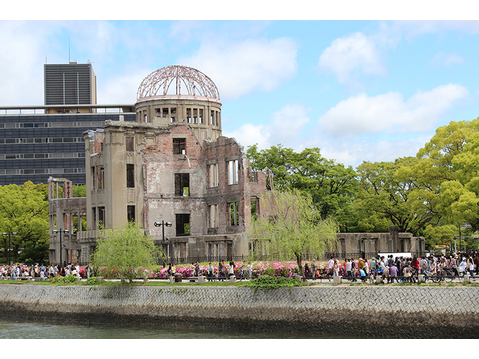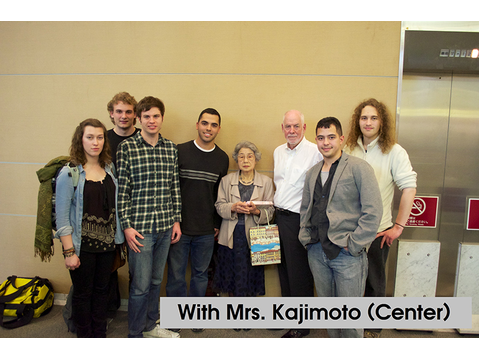Touching testimony of an atomic bomb survivor
Mar 26, 2013 (Tue.)
(CAUTION: Descriptions of some of the events in this article may be disturbing.)
In the far end corner of the Peace Memorial Museum auditorium, an old Japanese lady is composedly sitting, waiting for her audience to gather up. Filled with empathy and deference, students quietly enter the room. They are all waiting to hear Mrs. Kajimoto’s testimony. At 82 years old, she is one of the few Hiroshima bomb survivors still alive nowadays. As hard as it is to go through these memories, Mrs. Kajimoto opens up to help people understand the effects of nuclear weapons. For the past thirteen years, she has been widening people’s minds by spreading her personal experience.
Looking back at the 20th century, the nuclear bombing of Hiroshima is one of the darkest events that has ever occurred. Regarding that tragedy, a question often crosses people’s minds. How did the Japanese people get the strength and courage to overcome such an event? For Mrs. Kajimoto, the value of life has always been her strongest motivation.
A day in hell
On August 6, 1945, no aerial warnings had been announced. When the bomb dropped at 8:15 AM, the tremendous shock, the aircraft propeller factory Mrs. Kajimoto was working in collapsed. For several hours, she was injured and stuck under the demolished building that was swallowed by the flames. When she finally freed herself, the vision of hell started. The city was pitch black and a smell of rotten fish filled the air. The few living people she crossed in the streets were completely burned and lacerated by glass. Some had skin hanging from their arms, others had their intestines hanging out. Frightened, she walked around the dead city, trying to find a safe place to go to.
In the next days, maggots had appeared in her wounds. Since there was very little medical equipment, the only way to get them out was with chopsticks. The Japanese government’s response came in very late and it took two months before she could consult a doctor who finally took the glass residue out of her body. For a long time, the survivors were left to themselves. Ten years after the bombing, the survivors finally received considerable medical help from the government. No psychological help was provided to them. Added to the physical pain they endured, the discrimination towards the survivors kept growing. Fearing the consequences of the radiation, people refused to marry and have children with the bomb survivors. It is the case of Mrs. Kajimoto, who never had the privilege to experience parenthood.
Strength and courage
Despite all the horrors she has gone trough, Mrs. Kajimoto isn’t filled with bitterness or hate. She has now forgiven the Americans. If the president of the United States came to Hiroshima for the 70th anniversary of the event that is coming up in 2015, she wouldn’t want him to express his guilt or excuses. What she has longed for is an anti-nuclear statement and promise to abolish nuclear weapons. An hour and a half later, her speech ends with a statement she has prepared in English specifically for her audience. Emphasizing her contempt to nuclear power, Mrs. Kajimoto hopes a similar situation will never happen again. That is why she continues to spread her personal story, even at 82 years of age.
Isabelle L'HERITIER
Exchange Student from the University of Quebec, Canada



